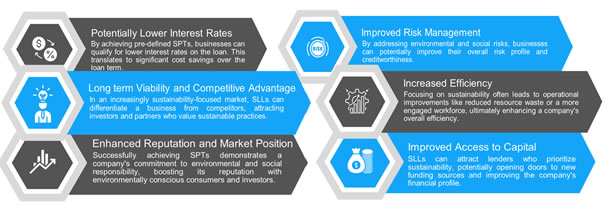Sustainability linked loans and the prospects for Nigerian businesses

Summary
There have been globally accepted principles promulgated over the years by collaborative efforts for sustainable finance.
Introduction
In recent years, there has been a profound shift towards sustainability themed investments with the aim of achieving financial returns while also aligning investment strategies with environmental, social, and governance (ESG) outcomes. This trend has become eminent in Nigeria with the growing interest in instruments such as sustainability linked loans (SLLs).
SLLs are loan instruments granted by financiers to borrowers where the borrowing terms and interest rates are tied to the borrower’s achievement of specific sustainability goals known as Sustainability Performance Targets. (SPTs). Whilst SLLs are likened to and sometimes used interchangeably with green loans and social loans, they are however not the same. Where the proceeds of green and social loans are used solely for green projects and investments or investments with a specific social impact, SLLs in comparison can be used for any general or specific corporate purpose wherein the commercial and/or economic terms of the loan arrangement are used to achieve SPTs. This, without doubt, offers more flexibility to borrowers when structuring their funding transactions.
Nigeria has indeed taken a committed approach to sustainability linked investments to address environmental and social needs. This is proven by the fact that Nigeria was the first African nation to issue a second series climate bond of N15 billion in 2019, having ratified the Paris Agreement, thereby pledging to reduce its greenhouse gas emissions by 20% by the year 2030.
Whilst this is laudable, there is still an untapped global SLLs market with prospects for Nigerian businesses. As estimated by the African Development Bank (AfDB), Nigeria requires about $247.3 billion within the next five years to meet its current sustainable finance needs, averaging $22.5 billion annually. This article seeks to highlight key SLL principles that can be adopted by Nigerian businesses to position themselves to meet Nigeria’s sustainable financing needs while taking advantage of the flexibility it provides to meet their key commercial and economic needs as a business as well.
Key sustainability linked loan principles (SLLPs)
Whilst sustainability linked financing is guided by principles that parties voluntarily choose to adopt and be governed by, there have been globally accepted principles promulgated over the years by collaborative efforts between the Loan Market Association (LMA), Loan Syndications and Trading Association (LSTA) and the Asia Pacific Loan Market Association (APLMA). Notably, the LMA published a 2024 guide on the application of SLLPs and some of these key principles include:
• Selection of Key Performance Indicators (KPIs): Borrowers must select KPIs that are measurable, relevant and comparable to external benchmarks such as the core business and sustainability strategy of the nation. The KPIs must also address key environmental or social challenges such as reducing greenhouse gas emissions, amplifying diversity, and promoting workplace safety practices, to mention a few. It is imperative that SLLs as loan instruments maintain their credibility. To this end, KPIs should be carefully selected to avoid the proliferation of non-credible KPIs.
• Calibration of SPTs: Ensuring accurate SPTs that align with identified KPIs is essential when structuring sustainability-linked loan transactions. This transparency reflects the borrower's commitment to sustainability and, ideally, SPTs should be relevant, established in good faith, and reviewed annually alongside the KPIs. However, well-justified exceptions to the frequency of the review can be negotiated between borrowers and investors and are typically treated on a transaction-by-transaction basis.
• Verification and Reporting: Key reports on the borrower’s SPTs should be made available to the lenders on a regular basis. All reporting requirements and indices should be decided and agreed upon during the negotiation of the facility. Lenders should also stipulate investment policies by which SPTs would be verified and where there is a change or shift in the verification mechanism, same must be duly communicated and agreed upon with the Borrower.
Benefits of embracing SLLS by Nigerian businesses
Commentary
SLLs indeed typify an innovative approach to integrating sustainable objectives into financial systems. By incentivising sustainable business practices, these cutting-edge financial instruments can accelerate the progress towards a more resilient future for sustainable financing not just for borrowers, but also for investors and the Nigerian society at large.
Nigerian financial services players can champion a sustainable future by aligning their practices with the Sustainable Development Goals. This commitment goes beyond borders, fostering economic growth and environmental and social well-being within Nigeria. Indeed, the nascency of the SLLs market in Nigeria is a major consideration for businesses as it is a relatively new terrain, and businesses may not be fully aware of its nuances and the benefits it offers. It is, therefore, imperative that awareness be raised amongst the financial sector ecosystem players in Nigeria and that there is a bridge for the knowledge gap between sustainable finance practices and mainstream financial sector practices.
Regulators also play a crucial role in shaping the landscape for Nigerian businesses engaging in sustainable finance practices. This would include creating and adopting policies and regulations tailor-made to cater to the Nigerian commercial and economic needs, incorporating globally accepted best practices and the Securities and Exchange Commission’s Green Bond Rules is a step in the right direction.
Regulators can incorporate international best practices to mirror the key developmental aims of SLLs and match intent with innovative policies. These global best practices should be tailored to Nigeria’s environmental and social realities to promulgate workable and effective regulatory frameworks.
Furthermore, fostering an environment that embraces innovation, which includes allowing flexibility in regulations for new sustainable finance products, piloting financing models tailored to Nigeria's unique needs, and identifying the most effective approaches for compliance and enforcement, would yield undeniable results. Finally, regulators can collaborate with stakeholders to raise awareness on risk mitigation and can also ensure that financial players in the sector effectively manage and mitigate ESG risks by monitoring and enforcing ESG risk management and reporting practices.
Detail Commercial Solicitors is distinct as Nigeria’s first commercial solicitor firm to specialise exclusively in non-courtroom practice. Based in Lagos, Nigeria’s business capital, DETAIL is totally committed to its clients’ business objectives and reputed for dealing with the minutiae. Email: info@detailsolicitors.com.
Related
-
Nigeria’s insurance sector: Growth beckons
From our research findings, it was discovered that the most common reasons for not having an insurance policy is ...
-
New report addresses climate change risks and opportunities in insurance
The report delves into the strategies and tactics needed to move forward in an evolving risk landscape.
-
Access Bank's environmental leadership
In its determined efforts at mitigating the adverse impacts of harmful environmental actions, Access Bank has introduced a ...









_-_300x350-202501141442143232.jpg)
